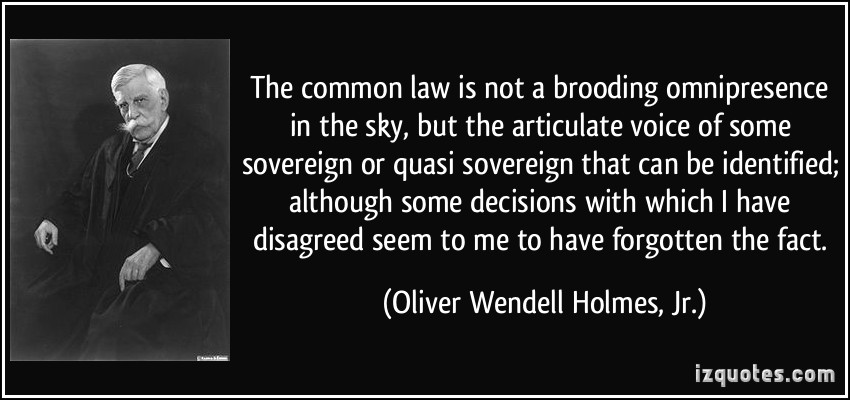Not that Holmes. This one. In our previous blog post (11/14/14), we promised to explain why our defense of Bayesian methods is relevant to law. After all, how is probability theory generally or any of the foregoing specifically — i.e. Hájek’s analysis of the reference class problem, his critique of radical subjectivism, and our critique of Hájek’s critique — relevant to law? In short, probability theory, Hájek’s paper, and our critique of Hájek are relevant to law in many ways.
Consider, for example, the close relation between the reference class problem and legal reasoning, especially the doctrine of binding precedent and the legal principle that “like cases should be treated alike.” A general principle in common law legal systems is that similar cases should be decided the same way so as to give similar and predictable outcomes, and the doctrine of precedent is the mechanism by which this goal is attained. A precedent is thus a principle or rule established in a previous legal case that is binding on a court or other tribunal when deciding subsequent cases with similar issues or facts.
But in order to determine whether the facts of one case are substantially similar to those in a previous case, we must engage in reasoning by analogy, and the reference class problem infects legal reasoning or reasoning by analogy because no two cases or sets of cases will be identical in all their particulars. In other words, if we are asked to determine whether case A is similar to case B, we must first determine whether case A and case B are in the same reference class. The problem, however, is that any given case may be incorporated in many possible reference classes.
Beyond the problem of precedent, Hájek’s critique of radical subjectivism and our critique of Hájek’s critique are especially relevant to the prediction theory of law, a theory of law which we endorse. (By the way, the prediction theory of law has inspired our research and is what this blog is mostly about.) Recall that Oliver Wendell Holmes introduced the prediction theory of law in his influential essay “The Path of Law.” In brief, Holmes believed that the law should be defined as a prediction, most specifically, a prediction of how courts behave in deciding a pending case. But how should we make predictions in law? As Hájek himself explains in his reference class paper, all the leading interpretations of probability are contaminated by the reference class problem — all but one, radical subjectivism. Why not? Because radical subjectivism regards probabilities as degrees of belief, and as Hájek notes in his paper (pp. 576-577), degrees of belief are purely personal or subjective estimates of probability.
Remember, however, that the subjectivist or Bayesian approach to probability has two separate steps — subjectivism not only requires us to assign a probability to a proposition or prediction (e.g. that a court will decide a case in a particular way); it also requires us to continually update our prior beliefs whenever we receive new information relevant to our legal prediction (e.g. the judge’s background, any recently-decided cases, the legal arguments made by the parties, etc.). In short, radical subjectivism is a useful — nay, ideal — method for implementing Holmes’s prediction theory of law. In making a legal prediction, we assign a prior probability to the outcome of the case (such as 0.5 if we are dealing with a close or hard case), and we continually update our priors as we receive new information relevant to the case. Simply put, Holmes, were he alive today, would probably be a radical subjectivist, a Bayesian!




Reblogged this on prior probability and commented:
In honor of Oliver Wendell Holmes, Jr.–the great North American scholar, jurist, and epistolarian, who was born on this day in 1841–I am re-posting this blog post from 2014.